Movies on DVD
Lone Star Cinema: 25th Hour
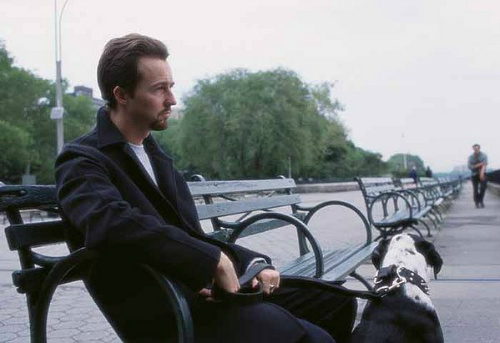
It seems strange to select such a New York City-centric film as Spike Lee's 25th Hour for Lone Star Cinema, but the epilogue for the movie was filmed in our state. So, here we are. Released a year after 9/11, the movie moves at a kind of meditative pace as drug dealer Monty Brogan (Edward Norton) spends his last day as a free man in NYC. He meanders around the city with his rescued pitbull Doyle, and has dinner with his dad (a gruff Brian Cox, The Bourne Identity) before meeting friends at a club for one last fete.
There are a few flashbacks as Monty recalls meeting his younger lady love, Naturelle (Rosario Dawson, Rent) and suspects her possible involvement in the bust that led to his arrest. His two closest friends are from childhood: slick investment banker Frank (Barry Pepper, True Grit) and lumpy prep school teacher Jacob (Philip Seymour Hoffman, Capote). All three commiserate and celebrate with Marty as he faces a seven-year sentence.
25th Hour is based on a screenplay by David Benioff, who wrote the original novel (and would go on to run HBO's Game of Thrones). The language is gritty, especially in the harsh monologue Norton's character delivers to a bathroom mirror: a rant about ethnic and other minorities in the city that speaks more to his feeling of absolute desparation than anything else. The rapport between the three fellows is often believably strained and forced, for what do they really have in common anymore besides the length of time they've known each other?
Lone Star Cinema: D.O.A.
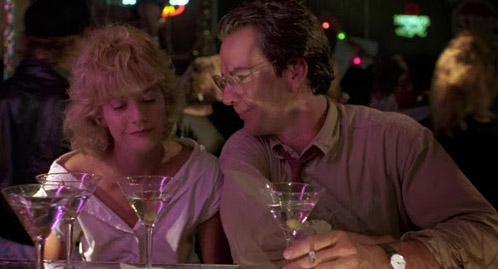
Had the stylish thriller D.O.A. been more plausible, it might be more than a footnote in the history of Austin film.
Released in 1988, the murder mystery had much promise. After all, it was a loose remake of an iconic Fifties whodunit of the same title. Its leads were Dennis Quaid and Meg Ryan, two sexy Hollywood darlings on the verge of megastardom. At the helm were Annabel Jankel and Rocky Morton, co-directors of the innovative, critically acclaimed and quintessentially Eighties TV series The Max Headroom Show.
But for all its potential, the movie D.O.A. is mostly forgettable mix of crime thriller clichés and farfetched plotting. It's a watchable bit of neo-noir, but nothing more.
Lone Star Cinema: Friday Night Lights
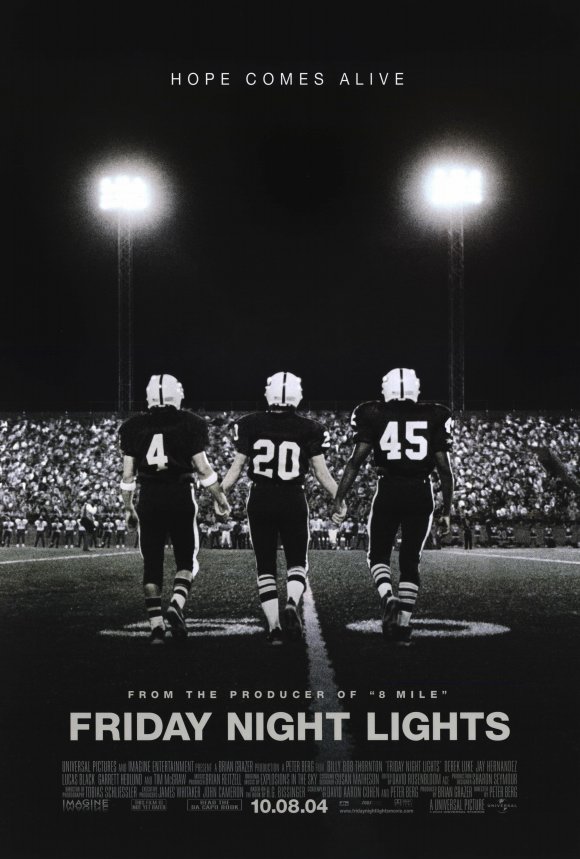
For this Thanksgiving week edition of Lone Star Cinema, I selected an influential football film from the mid-aughts. Before the acclaimed series Friday Night Lights started shooting in town, the 2004 film, starred Billy Bob Thornton as coach to a Texas high school football team. Based on the same-titled book by Buzz Bissinger, Friday Night Lights depicts the 1988 season of the Permian Panthers of Odessa, from the promising pre-season to their challenging finish at state.
The movie places quick scenes from the lives of several of the senior players in between montages of the Friday night action in Odessa's Ratliff Stadium. Derek Luke (Antwone Fisher) plays Boobie Miles, an assured running back who is the team's star. I'd argue Luke gives the best performance in the movie. Midway through Friday Night Lights, his character faces an obstacle he may not be able to overcome, and Luke aptly conveys Boobie's bluster, might and heartbreak.
Quiet quarterback Mike Winchell (Lucas Black, Sling Blade, Jarhead) finds it hard to engage in the game as his thoughts dwell on his uncertain academic future and the fate of his sickly mother. Billingsley, the fullback played by Garrett Hedlund (Tron: Legacy), lives with an abusive drunk dad (country singer Tim McGraw) who was once on a Permian team that won the state championship.
I wanted to know more about the backstories of younger player Comer -- the recently departed Lee Thompson Young (The Famous Jett Jackson) shows such promise here -- as well as stoic linebacker Ivory Christian (former UT player Lee Jackson) and safety Chavez (Jay Hernandez, spotted on ABC's Nashville). For a film that is practically two hours long, Friday Night Lights is relatively light on plot and spends much of its time on the field. I guess if I want to know more about the players, I'd have to read the book.
Lone Star Cinema: JFK

Oliver Stone isn't known for subtlety. From the sledgehammered anti-greed message of Wall Street to the relentless nihilistic violence of Natural Born Killers, the director seldom is guilty of understatement.
Stone's most ambitious film, JFK, is no less over-the-top than his other works. Released in 1991, JFK is an orgy of Stone's signature style, a movie saturated (really, oversaturated) with visual and sound effects, artsy segues, and themes repeated too often. It's also one of the most important films made in Texas, a hugely successful and controversial movie by one of the most popular directors of its era.
As its title implies, JFK is about the assassination of John F. Kennedy, but it's less about the tragic event than the countless conspiracy theories surrounding it. The film is based on the real-life story of New Orleans District Attorney Jim Garrison (Kevin Costner), whose suspicions about Kennedy's murder led him to conduct a years-long investigation.
Lone Star Cinema: The Best Little Whorehouse in Texas
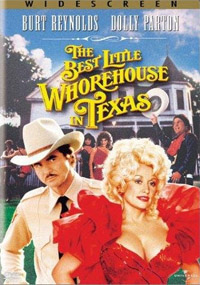 The level of camp in The Best Little Whorehouse in Texas is obvious from the start. Jim Nabors narrates its opening sequence as the amiable Deputy Fred, and he explains the history of the infamous Chicken Ranch brothel as we watch an overview of prostitution through the ages. Everything is fabulously, raucously choreographed -- and the choreography and camp never end in this endearingly goofy movie.
The level of camp in The Best Little Whorehouse in Texas is obvious from the start. Jim Nabors narrates its opening sequence as the amiable Deputy Fred, and he explains the history of the infamous Chicken Ranch brothel as we watch an overview of prostitution through the ages. Everything is fabulously, raucously choreographed -- and the choreography and camp never end in this endearingly goofy movie.
The 1982 film is mostly faithful to the hit musical of the same name, which is somewhat less faithful to the real story of the Chicken Ranch and investigative reporter Marvin Zindler's crusade to close it.
Set in the mid '70s, The Best Little Whorehouse in Texas is the saga of an iconic brothel in the fictional southeast Texas town of Gilbert. (The real brothel's home was La Grange.) Madam Mona Stangley (Dolly Parton) and her employees go about their business with plenty of support from the townspeople, and Miss Mona is a generous and respected member of the community. Even the law is on the brothel's side; this is not surprising, given Mona's longtime affair with Sheriff Ed Earl Dodd (Burt Reynolds).
All is well until Houston TV reporter Melvin P. Thorpe (Dom DeLuise) decides to do an exposé on the Chicken Ranch as a ratings ploy. Sheriff Dodd tries to intervene by paying Thorpe a friendly visit, but to no avail; as Dodd watches, the self-aggrandizing Thorpe announces on his show that "Texas has a whorehouse in it."
In desperation, the sheriff convinces Mona to shut down the Chicken Ranch until the unwanted attention fades away, hoping to foil Thorpe's plans to catch the working girls at work. Mona agrees, but then keeps the place open for one more night for some of her best customers -- the Texas A&M Aggie football team, seeking their traditional reward for defeating the University of Texas Longhorns. (The Longhorns earn the same reward when they win.)
Thorpe ambushes the Chicken Ranch and catches the Aggies in flagrante delicto, infuriating Sheriff Dodd and creating a scandal that ultimately involves the governor of Texas (Charles Durning).
Does the Chicken Ranch survive? If you know your Texas history, you know the answer; if not, you'll have to watch The Best Little Whorehouse in Texas to learn the fate of Miss Mona and her girls.
Lone Star Cinema: Rushmore
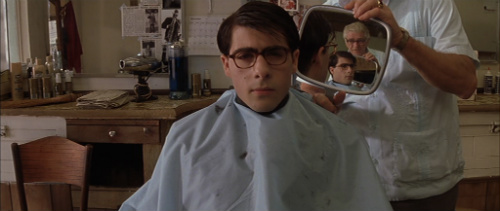
Rushmore tends to be a favorite among Wes Anderson fans I've known. Even people who don't typically like Anderson's movies still appreciate the 1998 prep school comedy. Anderson's second film, based on a screenplay he wrote with Owen Wilson, has bite to it, and isn't as overly stylized as his later works.
Jason Schwartzman plays 15-year-old Max, who is overinvolved with extracurricular activities at Rushmore Academy, a boys' prep school. He's not as adept at academics, however. The headmaster (Brian Cox) refers to him as "one of the worst students we've got." In one fall month, Max becomes besotted with widowed grade-school teacher Ms. Cross (Olivia Williams) and befriends bored millionaire Harold Blume (Bill Murray).
Max is self-confident, yet struggles when Ms. Cross doesn't return his affections. Both he and Blume stalk Ms. Cross periodically. During a recent re-watch, my friend and I found this harassment -- along with Max's shooting of an air rifle at the school campus that was supposedly funny at that time, I guess -- off-putting. Max is finally humbled when his quest to build an aquarium in her honor (on school grounds) gets him expelled.
Lone Star Cinema: A Perfect World
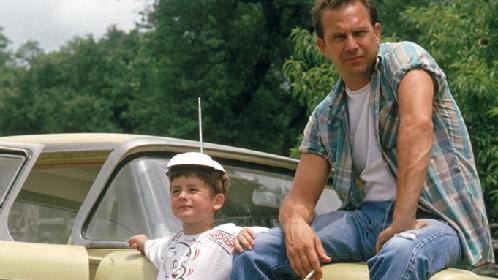
A Perfect World is a somewhat forgotten Clint Eastwood film, which is a shame. It may not be quite in league with Eastwood's best work (that's a very tall order), but this unconventional crime film is both a gripping chase movie and a nuanced tale of a relationship between a misunderstood criminal and a young boy.
Eastwood directed and starred in this 1993 drama set in 1963 Texas, in which he plays Texas Ranger Red Garrett, a seasoned lawman in pursuit of prison escapees Butch Haynes (Kevin Costner) and Terry Pugh (Keith Szarabajka). Shortly after their escape, Butch and Terry break into a house and kidnap 9-year-old Phillip Perry (T.J. Lowther), son of a devout Jehovah's Witness mother.
Lone Star Cinema: Along Came Kinky...Texas Jewboy for Governor
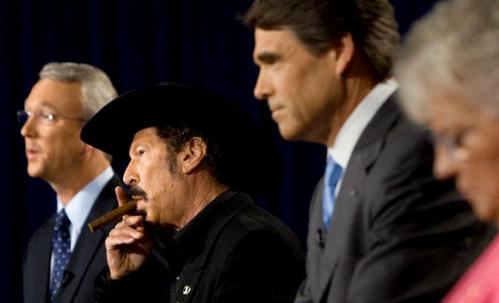
Why the hell not?
-- Campaign slogan for Texas gubernatorial candidate Kinky Friedman
Should Kinky Friedman be governor of Texas? There are plenty of reasons why the hell not. There also are plenty of reasons to watch Along Came Kinky ... Texas Jewboy for Governor, a lively 2009 documentary about Friedman's quixotic campaign for the office.
A mystery novelist, satirist and proudly offensive musician by trade (his band, the Texas Jewboys, was famous for songs like "Asshole from El Paso"), Friedman entered the 2006 Texas gubernatorial race with no political experience but plenty of name recognition as a Texas icon. He found himself in an unprecedented four-way race that offered voters and pundits plenty of political Lone Star lunacy.
The campaign was surprisingly fierce and competitive, at least to determine who would be runner-up to incumbent governor Rick Perry. Perry relied on his incumbency and redder-than-red conservative record to remain comfortably ahead in the polls and fly above most of the political fray throughout the race. Meanwhile, Friedman locked horns with mostly unknown Democrat Chris Bell and brash longtime Texas politician Carole Keeton Strayhorn (like Friedman, an independent candidate) in a battle for the voters' attention, if not a realistic bid for victory.
Lone Star Cinema: Rush

Gregg Allman has had a fabulous career as a musician, but he could have been just as successful as a drug dealer.
That is, if he could be as intimidating as his drug-dealing character in the crime drama Rush. Allman portrays dealer William Gaines in an almost wordless performance; Gaines rules his seedy empire with quiet, menacing stares, making customers, rivals and cops think twice about crossing him.
Allman's performance is terrific, as are several others in Rush. Set in 1975 and released in December 1991, the Houston-filmed movie Rush is a gritty, tragic tale of two small-town Texas cops who go undercover to infiltrate the town's drug scene. It's an unnervingly realistic film about the morally murky world of drug trafficking and narcotics enforcement, where the line between right and wrong isn't always clear.
Rush's story is gripping if not original. Assigned the difficult and dangerous job of bringing down Gaines, veteran narc Jim Raynor (Jason Patric) chooses young officer Kristen Cates (Jennifer Jason Leigh) as his partner. Cates has no experience with drug enforcement or undercover work, so Raynor's first job is to teach her to be a convincing junkie, to the point of doing drugs with the dealers to establish credibility.
Lone Star Cinema: Lone Star
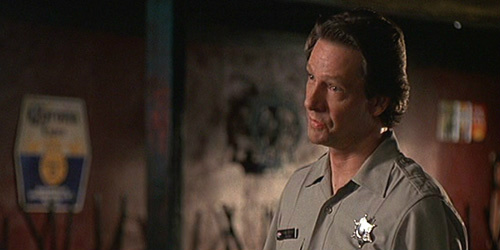
The relationship between Mexico and the U.S. serves as a continual inspiration to director John Sayles, it seems. Someone asked him about this recurring theme after the Go for Sisters screening at SXSW earlier this year, and it shows up in that film as well as earlier works Hombres Armados (Men with Guns) from 1997 (all right, that movie is only based in Mexico, but still), and the 1996 movie Lone Star.
Lone Star takes place in fictional Frontera (that's Spanish for "border"), Texas. Since it's the late '90s, this is before any border walls were up, and you didn't need a passport to travel between the countries. Which is not to say that there aren't border politics in this film.
Sayles, as in his later Sunshine State, attempts here to give voice to those whom we don't typically see in film as he portrays issues endemic to our state. For instance, an argument amongst parents in a classroom over how Texas history appears in textbooks still seems sadly relevant in 2013.

